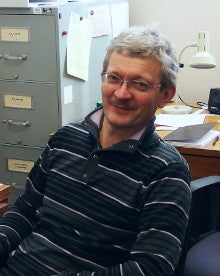Adjunct Faculty; Principal Research Officer, NRC

Dr. Sergei Studenikin holds a position of a Principal Research Officer at the National Research Council of Canada, Security and Disruptive Technologies Center located in Ottawa. Simultaneously he is an adjunct professor at the Department of Physics and Astronomy, University of Waterloo. Currently he is working on fundamental properties of single electron and hole spins isolated in semiconductor quantum dot (QD) devices for quantum computing and quantum communications.
Dr. Studenikin graduated from Novosibirsk State University, City of Novosibirsk, Russia, in 1981. He received his Ph.D. degree in physics of semiconductors and dielectrics from the Institute of Semiconductor Physics, Russian Academy of Sciences, Novosibirsk, Russia, in 1987. In 1987-1996 he worked in the Institute of Semiconductor Physics as a Research Scientist and a Senior Research Scientist. Simultaneously he held a part time assistant professor position in the Novosibirsk State University serving as a lecturer.
In 1996, he accepted a research position in Guelph University, Guelph, ON, Canada, where he accomplished a series of pioneering works on physical properties of ZnO and other metal oxide films. In 2001, he joined the National Research Council of Canada. His is currently holding a position of a Principal Research Officer (since 2019) at NRC and Adjunct Professor (since 2006) at the Department of Physics and Astronomy in the University of Waterloo.
Contact information
Email: sergei.studenikin@nrc.ca
Websites: Google Scholar | Researchgate